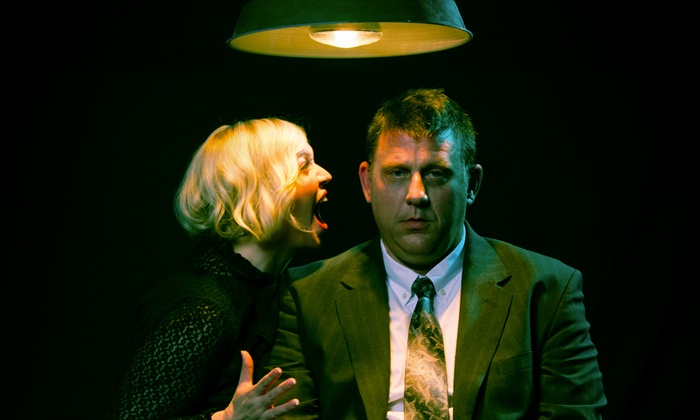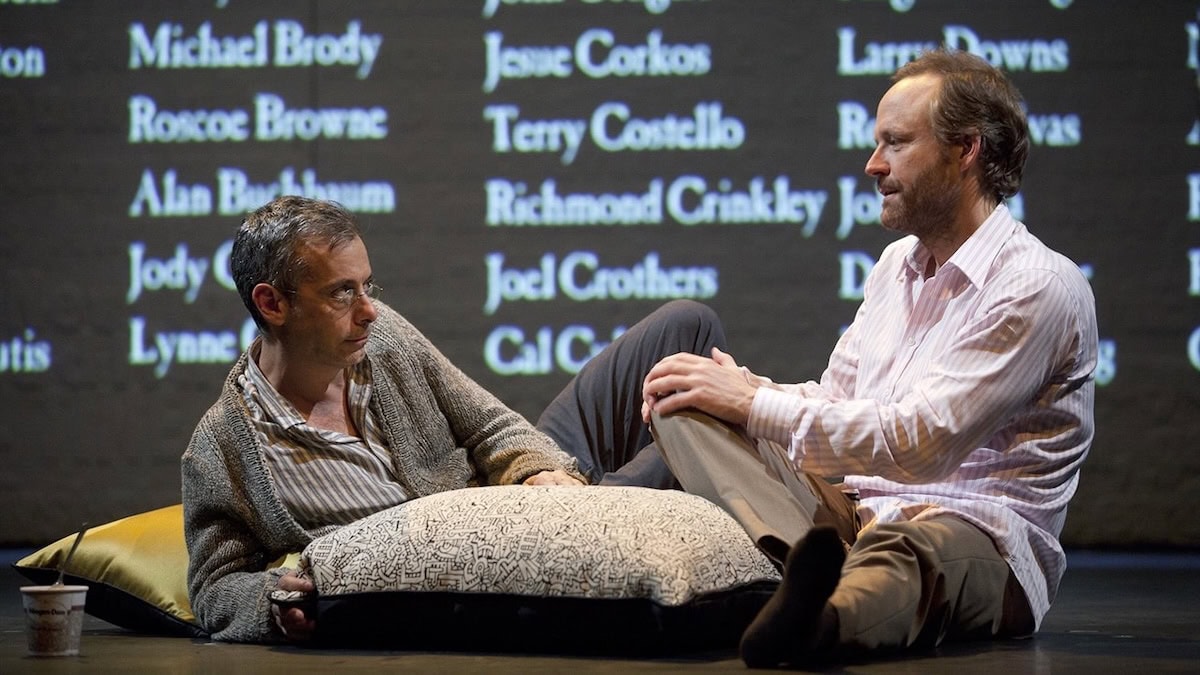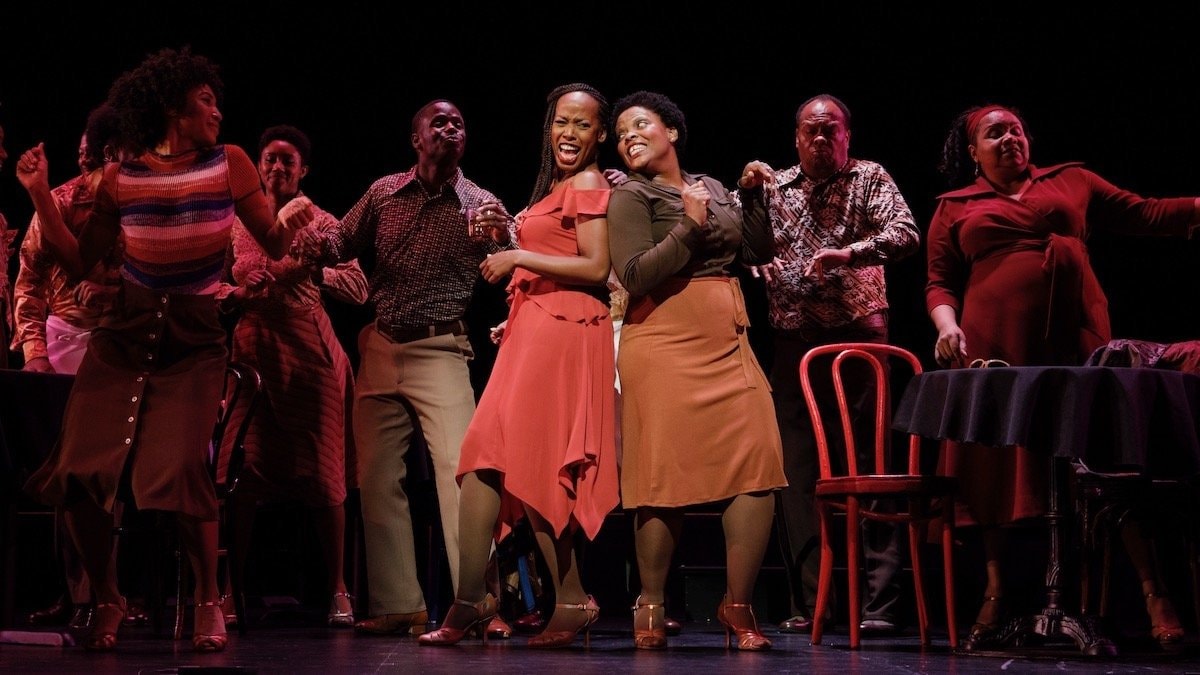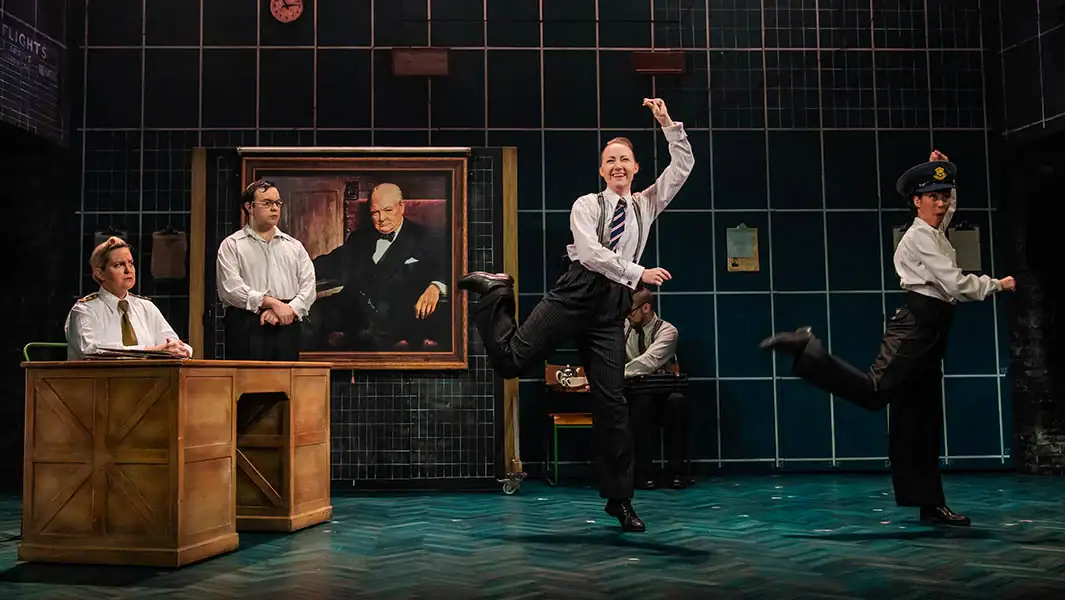
As revelations of Harvey Weinstein’s abuses made national headlines, our cast and production team pondered a telling and troubling comment expressed by a man following one of our performances.
We had just opened the regional premiere of Adding Machine: A Musical at Theatre Three in Dallas. Cynically funny and complex, Jason Loewith and Joshua Schmidt’s 2009 Off-Broadway musical is an adaptation of the 1923 play The Adding Machine by Elmer Rice. It centers on Mr. Zero on the day of his twenty-fifth anniversary at a dead-end accounting job at a department store. When he realizes he’s to be fired and replaced by a highly efficient machine, Zero murders his boss on the spot, is summarily executed, and then, with chilling ambivalence, faces the prospect of eternal freedom in the afterlife.
This musical is itself a demanding, albeit rewarding, machine. Artistic Director Jeffrey Schmidt chose it as a part of his first curated season, saying, “I made a promise to challenge artists and audiences; Adding Machine demands focus from both. You don’t casually watch this show and you definitely don’t casually perform it.” Our music director, Mark Mullino, often noted that the eclectic, sophisticated score surpassed Sondheim in vocal and instrumental difficulty. At our first rehearsal, director Blake Hackler further challenged us to consider the state of a person bereft of voice, power, or agency. He worked to heighten each moment with sharp specificity and to mine every opportunity for dark humor or desperation. The exceptional design team included choreographer Danielle Giorgiou, whose stylized movement – whether expressing romantic ideals or sadistic morality – added a sense of repetitive entrapment. And set designer Jocelyn Girigorie created a stark, nimble, and disturbingly uncertain black-and-white 1920s-era existence.
We were aware that a show this eclectic and this varied in potential cultural relevance would prompt a range of diverse responses from our audiences. Alongside Mr. Zero’s anti-hero narrative, the show features a number of equally provocative characters, all stuck in the Machine of Life, foolishly determined that their efforts within the system will eventually add up to something meaningful. I played Mrs. Zero, Mr. Zero’s bitter, bickering wife of twenty-five years. Then there’s Daisy, Mr. Zero’s naive accounting assistant, who longs for him to requite her unconfessed love. In prison, Zero meets Shrdlu, a man who has lived his entire life in fervent submission to his strict and self-righteous mother. Even the ensemble characters (Mr. and Mrs. One; Mr. and Mrs. Two) reinforce a sense of shared subjugation, down to the pecking-order of their very names.
Our audiences were sure to find plenty of reasons to despise these stubbornly ignorant characters as they persist in utterly futile efforts toward what they claim to want in life. They’re trapped and frustrated, suppressing occasional urges to break free. They fantasize about taking extreme measures, only to shrug off jeopardous ideas because they “didn’t have the nerve” to follow through. Their longings intensify and overflow in impulsive “accidental-on-purpose” instances, finally reaching a violent tipping point… killing a boss, abandoning a spouse on the eve of his death, murdering a mother, or taking one’s own life.
What these humans have in common is that they each struggle with a maddening sense of powerlessness – further exacerbated by the ways in which they remain blindly complicit in their own enslavement. The final response of some of these characters when finding freedom is disconcerting as we realize that many of us, also, would rather choose to strive in vain within a fixed and false system of achievement or perfectionism or social status or moral hierarchy or racial superiority or idealistic romance or any number of other power constructs – even if it means starting all over again from status Zero – rather than to accept that our work and our worth is no greater than that of any other soul. In fact, when Mr. Zero is deeply offended by the thought of equal eternal reward for all mankind, it’s a sure sign that he may, once again, reject the Music for the Machine.
Adding Machine was sure to provoke in some way. But the offense of this particular patron centered on my character, Mrs. Zero. Now, Mrs. Zero has the unenviable task of opening the musical with one of the most difficult songs in the show, an erratic and dissonant number during which she, the ensemble, and each of the orchestra pieces are often performing contrasting melodies and rhythms at once. The lyrics begin with the idle prattle of a housewife peppered with hints meant to nudge Mr. Zero toward taking her to see the movies that all the other ladies gossip over. Little jabs directed at her husband creep into Mrs. Zero’s banter as he continues to ignore her, until she spirals into bitter and resentful verbal abuse. Our cast frequently noticed audience members shifting uncomfortably in their seats, visibly rattled by the unconventional sights, sounds, and subject matter of that first musical number.
This one man cornered our music director following a performance to say that while he admired the production and performance quality, he greatly disliked the show. Our music director nodded, understanding that some patrons simply wouldn’t care for this kind of a musical. However, the man then made a point to say, specifically, how much he “hated that Mrs. Zero” (again, kindly clarifying that his distaste had nothing to do with my particular performance but rather with the character, as written).
Then he added, with startling boldness: “The minute Mrs. Zero started in on Mr. Zero, I, along with every straight man in that theater, immediately just TUNED. HER. OUT.”
It struck me that this man felt he could confidently speak for every straight man in the theater as a homogeneous group and claim, without hesitation or apology, that straight white men uniformly know that if a woman is aggrieved or frustrated or emotional… they don’t have to listen. They get to “tune her out”. Because they can.
Our cast and crew continued talking about this encounter over the following few weeks as an ever-multiplying number of female voices attested to the crisis of rape and sexual harassment in our nation. Our Mr. Zero, Thomas Ward – who, ironically, had just been awarded Dallas-Fort Worth Critics Forum Best Actor for his role as ‘Matt’ in the regional premiere of Young Jean Lee’s Straight White Men – pointed out that the same people tuning out Mrs. Zero’s outrage were also likely among those chuckling later in the show when Mr. Zero alludes to having “accidentally” hit his wife. Some female crew members shared stories of work-related discrimination. And we continued to perform this fascinating musical retelling of Mr. Zero’s story. But for us, the man’s comment seemed to augment the other voices in the show. Mr. Zero is, after all, both Mrs. Z and Daisy’s “Machine”, representing the dominant power over their lives. Mrs. Zero resents the fact that she is subject to him both socially and financially as his wife. And Daisy, sadly, voluntarily relinquishes all her power, self-worth, and even her desire for life and freedom to Mr. Zero and calls it ‘love.’
These characters were written (nearly one hundred years ago) to be tauntingly unlikeable. We see them at their worst so that we might examine the worst in ourselves – those ways in which the harsh perso
nal ledgers that define and enslave us breed cycles of ignorance, prejudice, and violence. There are plenty of opportunities to “tune out”, if you so choose. To “Listen!”, as several characters exclaim when Mr. Zero faces his final tests, is not easy. But as this play indicates, those who are willing to “Listen!” – however difficult that may be – may find understanding. They will have the chance to hear and to share in the freedom of the Music beyond the Machine.
Later, I was saddened to learn that our tuned-out audience member is an enthusiastic theatre-goer and sees nearly everything staged in our city. I’m thankful for his patronage. But I wonder how many other times he has experienced a piece of regional theatre provocative enough to reveal his pet biases or beliefs. As theatre makers, we live for these moments. They are the opportunities for conversation, reflection, and growth. After all, if not for our capacity to empathize and evolve, we would be little more than mere machines. I hope our regional theaters continue to present works that challenge our communities. I’m certainly thankful to Theatre Three for doing so. And I sincerely hope we all continue to listen.
During his curtain speech before every show, our Artistic Director, Jeffrey Schmidt, references the original The Adding Machine play (produced at Theatre Three in 1969) and asks us to consider what has changed since that time and what hasn’t. Contrary to Mr. Zero’s small-minded aspirations expressed toward the end of the show, here’s to hoping we all continue to “learn something new” at the theatre.
To purchase a copy of Adding Machine, click here, and to learn more about licensing a production, click here.

The Truth Behind… The Normal Heart

Musical Revues

